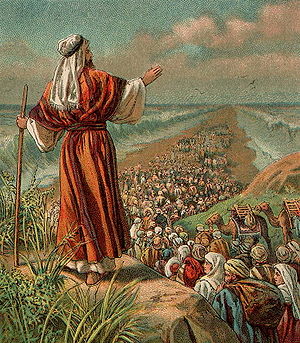Last week someone said to me, “Rabbi, did you know there are people who say the Exodus never happened?” It’s a question I often get about this time of year.
The question comes up because the Exodus is the narrative that forms the bedrock of the Jewish story. We have a holiday, Passover, just to transmit that story. And yet it is a story for which there is no outside evidence at all. No archaeologist has been able to find an inscription or the remains of a camp, or anything.
So we cannot prove that the Exodus happened exactly as the Bible described it.
This does not trouble me in the least. For one thing, why would anyone but us have recorded it? It was an embarrassment to the Egyptians. It was not an important event to anyone but Hebrews and Egyptians. It was the story of the Jews, as experienced by the Jews.
Every family has those stories. My grandmother told stories about my family coming from Ireland. After she died I tried to document her account. What I learned was that the events described in her stories were the events as experienced by Bridget and Peter Carroll, my ancestors. They were the ones who left a starving land in one of the infamous “coffin ships” to come to America. I cannot prove their stories, because they did not keep the name of the ship. The only traceable thing they kept was the name of the cruel landlord, Mahon, and they kept that as “the dirtiest word in the Gaelic language.”
Their stories told who they were. The stories told about brave people who left a starving land, who took a big risk to come to a place where they could live with dignity. The stories told about a group of families who loved one another so much that they traveled in a group and settled together on rocky land near Dickson, Tennessee.
Just so, the Jewish story of Exodus is a story of a people who lived in slavery, but who felt that they were destined for freedom. They were destined to leave behind the mightiest king on earth, and to never forget that they were once miserable slaves. Their experiences on that journey could not be described in natural terms: they could only be described in the language of miracle. And today, still, their descendants – we! – are called, by their God and by our tradition, to remain awake to the miracles all around us, and to value freedom and human dignity above security or comfort.
That’s the story I believe.


Wonderfully put Rabbi, thank you!
Thank YOU! I’ve become a regular reader of your blog and a big fan.
Sorry Rabbi, it’s not “Mahon” a proper name, it’s “mo thon” which means “my tuchus” and is not a swear word, or nearly the rudest term in Gaelic. If you had a boil there you cause use this in the doctor’s office without offending anyone at all.
That’s the thing, S, in the private language that my family’s Gaelic turned into after several several generations in a “holler” in TN, the word was “MaHon” and was regarded as such an awful word that my grandmother washed my mouth out with Ivory when I repeated it. She never would tell me what it meant, just that it was filthy. I was only able to unravel the whole story after I met a cousin whose branch of the family had retained the memory that there was an actual man of that name, Major Denis Mahon. Our family was from near Strokestown.
As with a lot of things with memory, things become scrambled, but in their scramble they take on new eloquence.